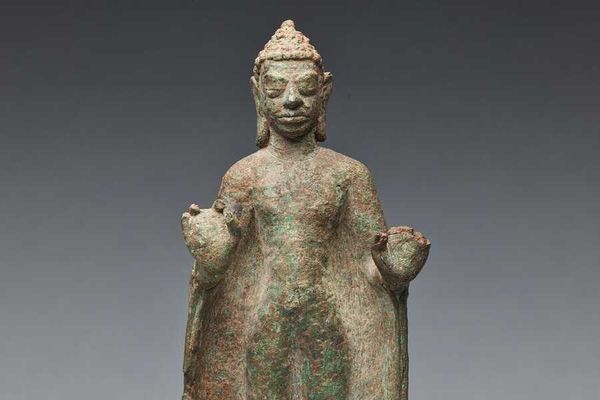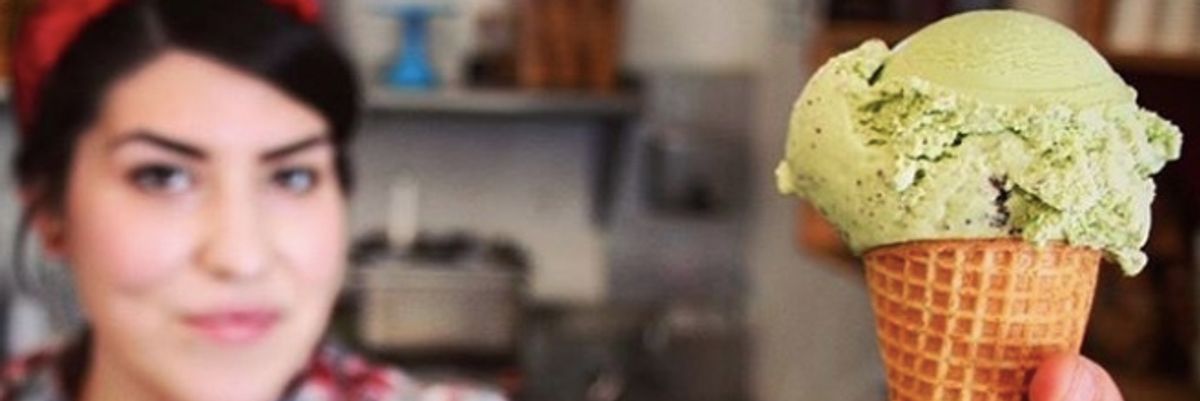courtesy of TankFarm Future Sounds
With an extensive resume and nine-plus years in the Bay Area music scene, Larry Little is the sonic guru behind the much sought-after and coveted TankFarm Future Sounds music compilations, which comprise new bands, many of them unsigned or on small indie labels. The former San Franciscan—who most notably managed It-band Film School and synth-pop powerhouse The Killers as well as DJed numerous venues all over the city—is a self-confessed music-obsessive compulsive. Little’s expert compilations—which humbly began as mix-tapes for friends—have helped spearhead an innovative and modernized solution to replace the flawed structure of the current and failing music industry. Part of what makes Larry Little’s vision with TankFarm Future Sounds unique is the stressed importance of giving back autonomy to up-and-coming and unsigned bands, instead of giving the power to record label executives. I recently had the pleasure of chatting with Little about the bourgeoning SF music scene, his intended mission with TankFarm Future Sounds and his new monthly indie dance club The Rumble at Harlot—the next one is Wednesday, November 7. Larry Little also put his master mix-tape skills to work and crafted an exclusive guest playlist for 7x7sf.com, featuring his favorite local groups.
What is the TankFarm Future Sounds’ mission statement?
Larry Little: Our mission statement is to spread great music from up-and-coming artists in new and unconventional ways. We’d like to help reinforce the idea that the industry is changing and that artists don’t have to be slaves to record labels in order to get their careers going; they just have to team up with the right partners that can help them achieve their goals without trading their credibility.
What do you find unique about the Bay Area music scene?
LL: It used to be that there was never a scene in SF, mostly because of band jealousy and a “hater” mentality. No one wanted to share resources for fear of the other band getting ahead of them. Now, it’s becoming more of a community, bands going out on tour together, sharing business contacts, vans, trailers, etc., and having fun creating a scene. What’s unique about the Bay Area is the combining of SF and Oakland, as well as the surrounding areas, and it comes with incredible history of completely changing the sounds of music evolution everywhere. From funk to hippies, what’s happened here has always altered the sound everywhere else. Today, nothing has changed. It seems you often get the incredible fringe movements developing in the East Bay that really are way out in front, that later get polished and built upon on the SF side.
What sparked the partnership with Tankfarm Clothing?
LL: I was looking for a lifestyle company to partner up with and didn’t want to go corporate and have some big brand name on it. I needed a partner because I was cranking the discs out of my own pocket for years and the mailing list had grown to the point where the postage alone was killing me. Having some outside help was necessary, and I also wanted to take the CD from being an industry-only compilation for A&R types to fans everywhere. TankFarm’s retail distribution of over 1,200 stores in the US was the perfect outlet, and besides that, their designs are very rock and roll, and the stores that carry the brand are all the places indie rockers shop. TankFarm was originally a record label that made shirts for their bands, until the shirts outsold the CDs, but the owners of TF were both in bands and know how important merch is for touring bands and how much distribution helps to grow your business.
Larry; the mix-tape master
How did you get into the music industry?
LL: I got in through the back door, and actually completely by accident. I always lived with bands and DJs in big crash pads that had people on the couch every night, just playing music all night. Because I was usually the only one not in the band, I would become the default manager. I worked in the dotcom boom at places like Excite.com and Napster/Roxio and was a manager of engineering teams, so the management part I had down. It wasn’t until I later met my partner in From the Future Management, Braden Merrick, that I made it an official career, but for a while I had to keep the day job. Braden and I used to DJ around town at various club nights. We realized we had a lot in common and we both were managing local acts, so we decided to jump in, create an LLC, and go for it. Some time later, we landed bands like Film School and The Killers, and here we are years later. I have a degree in broadcast journalism and always thought I’d be Bob Costas growing up, but you see how much my degree helped me.
What do you love about SF?
LL: Although I no longer live there, I still consider it home. It has all the wonderful parts of a place like New York City in terms of culture, but it is an easier place to live. Having everything a short drive away—from the beaches to mountains—is a huge plus. I miss Noe Valley and the Mission and going to the Bottom of the Hill a few nights a week.
How do you decide on which bands will make it on a Future Sounds comp?
LL: I listen to about 400 to 600 artists per month to make the final 15. I get the music from people sending me stuff, bands, managers, lawyers, labels, scouts, friends, etc. I also spend hours online every day downloading off band websites, radio playlists, magazines, Myspace, etc. What usually does it for me, more than knowing every A&R weasel around is into a band, is if the song remains in my head the next day or feels either familiar at first listen, or something totally different than what everyone else is doing. I usually know at first play, and if I have to convince myself something is good, it generally is on the bubble. My favorite thing is finding some new artist from nowhere, someone that’s still doing it for the right reasons, not just to be a star, but believes in what they are doing and needs someone to champion them inside the industry. I couldn’t be happier to see that old structure of the music industry crumbling and giving the power back to the artists.
What is the inspiration behind your new monthly DJ night the Rumble at Harlot?
LL: It’s about having a night where the Bay Area indie scene can come together and hear their music with their friends and mix it up with musicians and music industry types in hopes that these random meetings can generate new opportunities and friendships within the SF music community. Each month, we’ll have guest DJs from great local bands as well as our resident DJ Bagel Ted of Bagel Radio. I love working with all Bay Area companies like The Owl Mag, Villains, Atlas or SOMA FM Radio. At our first party (in October) at Harlot, I looked around at one point and counted representatives from 18 Bay Area groups in sight. Creating an environment where bands can network is important to me. I think it’s also great for local music fans to have a place where they can see their favorite bands off-stage, where they might get to actually tell them how much a particular song means in person or buy them a beer.
Larry demonstrating his DJ skills
If your apartment was burning down, and you could only take five albums with you, what would they be and why?
LL: That’s the kind of question that could keep me up for weeks, and still second-guess myself over and over again. Really depends on the day and what new sound kick I’m currently zoned in on. Your question is like asking my five favorite records of all time, as I have most of them on vinyl anyway, but it gives me fits. How about these, in no particular order:
1. The Greenhornes: The Greenhornes—just a great party record that never fails
2. The Sound: Jeopardy—I just can’t seem to find a backup copy, so I treasure this amazing record that is often overlooked.
3. The Feelies: Crazy Rhythms—A record I never get tired of, no matter how many times I’ve spun it.
4. The Meters: Let’s Party with the Meters—Another ultimate party record that only gets better with age.
5. The Beach Boys: Wow! What A Concert!—I’d grab this one because it’s the first record I’ve ever owned when my older brother Bob gave it to me. It has a version of the “Monster Mash” on it that rules!
Wow, I just realized they were all “THE” bands. Maybe that could be a mix tape theme?
How did you come up with the idea to create these Future Sounds comps?
LL: Because I always loved mix-tapes and mix-CDs, and was constantly telling people about bands that months later became big names, a friend kept telling me I should put my money where my mouth is and start a comp CD and he’d design it. His name is Sam Moreau, and I have him to thank for nudging me on it and designing the first 20-plus covers. It was a great way to spread the word about bands I loved, while also secretly (really not so secretly) mixing in bands I manage and branding my management company within the industry. It soon took on a life of it’s own.
Where can people find/get a hold of your compilations?
LL: In the Bay Area, you can find them in Nordstrom and Villains and Atlas in the East Bay. I believe Rolo and American Rag carry TankFarm as well, so it’s a gift with purchase in these locations. We’ll soon be rolling out an iTunes section where you can download online as well some new widgets we’re rolling out.
You’ve created a revolutionary way to discover new music. Do you see your model of music discovery and distribution happening in more of a wide scale? What do you predict for the future of the music industry?
LL: Wow, big question. Not sure I’m qualified to answer that big one, but I do see things becoming more exciting for the artists than ever before. With the decline of the importance on label size, presence on radio and even in traditional record stores, we’re seeing bands actually make a great living on their own as soon as they develop their own name and make their music available on places like iTunes and Rhapsody. I don’t think what I’m doing is revolutionary, but I do think it’s heartfelt and comes from a basic love of music and wanting to share that music. We want to set up a foundation where we have our own radio stations, our own TV stations, online partnerships with places like Myspace and iTunes, a worldwide tour and our own merchandise.
What SF-based bands are you into at the moment?
LL: If you don’t count my bands like Film School and Every Move A Picture, I’d say people like LoveLikeFire, The Frail, The Blacks, Sugar & Gold, Big Blue Whale, Magic Bullets, the Audrye Sessions, Mister Loveless and Rescue Me.
What advice do you have for up-and-coming local bands?
LL: Stick to what you can control first. If you aren’t causing a commotion locally, it’s going to be hard to convince people on a larger scale. Work your ass off and spend time online networking and network in your hometown. Identify who your audience actually is, and then figure out how you can speak to them and how you can get in front of them, and offer something genuine. Most important, write great songs and make your live show something spectacular. There is too much competition out there to just be good or even really good—be great.




















